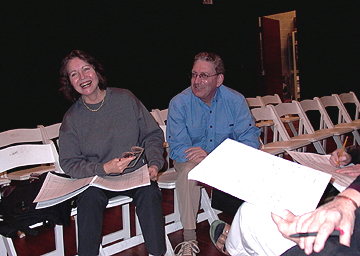
In honour of Ellen Taaffe Zwilich birthday, here is an interview where she shares her thoughts on writing this concerto Rituals for NEXUS. Frank Oteri at New Music Box calls the interview Goose Bumps In The Candy Shop. Ellen has some intriguing comments about percussion instruments and their intrinsic nature:
FJO: My favorite piece of yours still is Rituals, which is a concerto for percussion ensemble and orchestra, but you chose to call it something else. You give it an evocative name.
ETZ: Well I’ll tell you why. When I got this commission, I had no idea what I was going to do. That’s something I enjoy. I like to do it, and I don’t know how I’m going to do it. That to me is one of the pleasures. I went up to Toronto where Nexus has most of its instruments and where they rehearse. I spent a day or so with them and listened to them rehearse. I asked them what their favorite setups were. Things they particularly like to play. And I was immersing myself in all of these instruments, and most percussion instruments are connected very basically with some kind of ritual, whether it’s Asian, or American, or African, or whatever, they evoke things. Even one of my movements reminded me of the old movies in the ’40s and ’50s where somebody dies in the town and the church bells ring to announce to people that something has happened. So what I wanted to do in that piece is to dwell on the fact that these are ritual instruments. And not try to be something I wasn’t. I’m not Asian. I’m not African. I’m not a Hindu. I’m not necessarily a part of that, but to bring my feelings to each of these things. The first movement is called “Invocation.” In a lot of these cultures, before you play an instrument, it has to be blessed, or you have to be blessed. And they invoke spirits. The second movement is called “Ambulation,” and it runs through all kinds of things: dancing things, marching things, things that have to do with the kind of movement that you hear percussion with; they’re the very basis of those kinds of movements. The third was called something like “Memorial”; I don’t remember what I called it. And the last starts out as a friendly competition and ends up kind of like war. In another words, I wanted to get into the instruments in that way. I really do feel that the instrument has to tell you what kind of piece it wants. And these instruments told me they didn’t mind playing together. They came from all over the globe to one place. They like playing together, but they had a certain karma, and I wanted to sort of get into that. So that’s what that piece is about.
FJO: And that last movement even had sections that are improvised, which is unique in your compositional output thus far. Performances are never the same way twice.
ETZ: That’s right. Boulez used to say that when performers improvise you hear the music they know. But it’s very appropriate for these instruments you know, because that’s part of their karma. They’re not just laying down a drum track. They have this little flexibility and fluidity, and so there is some improvisation in there. I kind of gave them nuggets to work from. But I was happy, and I’m always happy when I hear another performance is different from the last one I heard because that means it’s living and breathing. And then breathing is something else that you don’t hear about in much of the discussion of certainly 20th-century music. Music has to have breath. It has to have line, it has to have breath, it has to have gut feeling, it has to have all of these things that are in us as humans. And that affects this thing that we call music.
You can read the entire interview (it covers a lot of interesting ground) by clicking here. You can also see a portion of the interview on YouTube here. Victor Carr Jr of Classics Today calls Rituals “a total delight”!
